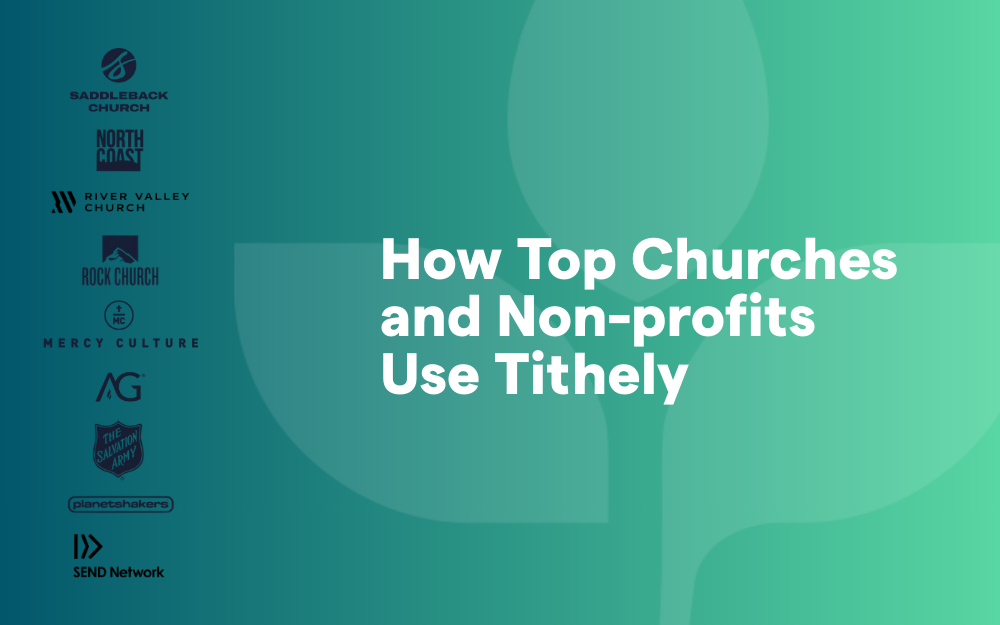Are Church Donations Tax Deductible?
Are church donations tax deductible? We'll outline what you need to know about what is considered deductible & what is not. Learn more here!
The end of the year is approaching fast, and you know what that means, right?
If you guessed Halloween, Thanksgiving, or Christmas, you’d be wrong.
What I have in mind are taxes.
Well, not “taxes” in the sense of how much you’ll need to pay or what you’ll receive in your tax returns.
Instead, I’d like to examine and help answer this question:
“Are church donations tax deductible?”
This is a legitimate question, but I understand if you feel bad asking about the deductibility of your donation amount (more on this later).
But here’s the deal:
In 2016, $390 billion was donated to charitable organizations.
Behind these charitable donations are countless individuals—including yourself.
So, is tithe tax-deductible?
The answer to this question is “probably.”
Let me show you what I mean.
The qualification of churches
To know if your church tithe is eligible for deduction, you have to check if your church is a recognized non-profit organization by the IRS. This will help you determine your church's tax-exempt status and your donations' eligibility for deduction. If it’s not, then your church donations cannot be deducted from your taxes.
Are you concerned if your church isn’t tax-exempt?
Hang tight.
According to the IRS regulations, your church receives an automatic tax exemption as long as it meets these minimum requirements :
- Must be organized and operate exclusively for religious and educational purposes
- May not significantly influence legislation
- May not intervene in political campaigns
- May not be involved in illegal activities
- May not violate fundamental public policy
Basically, accordingly to the IRS's guidelines as long as your church is a church, then it’s automatically tax-exempt.
But one last thing.
It’s still best for your church to file for tax-exempt status.
There are two big reasons why this is the case:
- Boosts donor confidence
- State tax-exempt recognition and documentation
For your financial supporters and congregation, possessing an official tax-exempt status provides peace of mind. It lets them know your church has taken extra steps to secure official recognition, and that their tithes and offerings are tax deductible.
Regarding state tax-exempt status, your church may not be eligible for certain state benefits, such as a state sales tax exemption. It’s best to double-check what additional benefits your church can secure by applying for an official tax-exempt status.
For additional information, see Tax Guide for Churches and Religious Organizations, speak with an attorney, or contact a local certified public accountant (CPA).
Now that we have this out of the way, let’s get to the question you're asking:
Are charitable contributions to churches tax deductible?
Is tithing tax deductible?
Well, the answer is yes and no.
Let me explain.
In general, you can deduct your church offerings from your taxes.
But there are a few things you must know regarding tax-exempt regulations:
- Charitable contributions have limits and cannot exceed 50 percent of your adjusted gross income (AGI)
- Tax deductions must be itemized
- Charitable donations must be made before the end of the tax year
For your taxes, you will not necessarily be taxed on everything you earn or receive. For example, your total annual earnings may be $60,000. However, your adjusted gross income (AGI) may be less after you take deductions from your income tax, such as student loan interest you paid or contributions you made to certain retirement accounts.
For the sake of simplicity, let’s say your AGI is $50,000. This means your tax deductions cannot exceed 50 percent of this amount ($25,000).
To receive a tax benefit for your tithes and offerings, your charitable contribution must be itemized at the time you file your tax return.
When you file your taxes, you have two choices:
- Itemize your deductions, or
- Take the standard deduction provided by the IRS
That’s all?
Not so fast.
There’s one catch.
In order to itemize your deductions, they must exceed the standard deduction provided by the IRS for your filing status. You'll need to calculate your total deductions, and if your itemized deductions do not exceed the standard deduction, then your charitable donations are not deductible because they do not provide a greater tax benefit from what’s already provided from a standard deduction.
Is your head spinning?
Thankfully, you don’t have to figure this out on your own.
If you have questions, please consult an accountant in your area to determine personal recommendations.
This leads us to the last point.
Can Christians claim their tithes and offerings on their taxes?
Are church tithes tax deductible? In the United States, it’s okay for Christians to claim their church donations as tax deductions.
For a variety of reasons, the United States provides this tax incentive to claim donations as a tax deduction, so there are no moral or religious objections to claiming your tithes on your taxes.
This tax benefit is one part of the heart behind Jesus’ words, when he said, "Therefore render to Caesar the things that are Caesar's, and to God the things that are God’s” (Matt. 22:21).
Or when Paul said,
“For because of this you also pay taxes, for authorities are ministers of God, attending to this very thing. Pay to all what is owed to them: taxes to whom taxes are owed, revenue to whom revenue is owed …" (Rom. 13:6-7).
From just these two examples, you’ll find ample reason to clear your conscience.
What is more, not accepting this tax benefit may even be considered poor biblical stewardship. The government provides this benefit to every American, so you can argue that by rejecting this benefit, you are not managing your financial resources well.
What I said may have you thinking:
Didn’t Jesus say to give in secret (Matt. 6:1-4)? Isn't claiming tithes and offerings a public display of giving?
In short, no.
In this passage, Jesus is really getting to the heart behind why we do or do not give. It’s okay for people to know you financially support your local church. Besides, your charitable contributions, church donations and personal tax returns are private exchanges and documents. Your charitable donations and taxes are (or should be) highly secured and only available for your eyes to see.
Now, if you’re claiming a tax deduction because you want someone you’ll never meet in the IRS to see how “generous” you are, then it’s probably time for you to talk to your pastor or Jesus.
Sign Up for Product Updates
The end of the year is approaching fast, and you know what that means, right?
If you guessed Halloween, Thanksgiving, or Christmas, you’d be wrong.
What I have in mind are taxes.
Well, not “taxes” in the sense of how much you’ll need to pay or what you’ll receive in your tax returns.
Instead, I’d like to examine and help answer this question:
“Are church donations tax deductible?”
This is a legitimate question, but I understand if you feel bad asking about the deductibility of your donation amount (more on this later).
But here’s the deal:
In 2016, $390 billion was donated to charitable organizations.
Behind these charitable donations are countless individuals—including yourself.
So, is tithe tax-deductible?
The answer to this question is “probably.”
Let me show you what I mean.
The qualification of churches
To know if your church tithe is eligible for deduction, you have to check if your church is a recognized non-profit organization by the IRS. This will help you determine your church's tax-exempt status and your donations' eligibility for deduction. If it’s not, then your church donations cannot be deducted from your taxes.
Are you concerned if your church isn’t tax-exempt?
Hang tight.
According to the IRS regulations, your church receives an automatic tax exemption as long as it meets these minimum requirements :
- Must be organized and operate exclusively for religious and educational purposes
- May not significantly influence legislation
- May not intervene in political campaigns
- May not be involved in illegal activities
- May not violate fundamental public policy
Basically, accordingly to the IRS's guidelines as long as your church is a church, then it’s automatically tax-exempt.
But one last thing.
It’s still best for your church to file for tax-exempt status.
There are two big reasons why this is the case:
- Boosts donor confidence
- State tax-exempt recognition and documentation
For your financial supporters and congregation, possessing an official tax-exempt status provides peace of mind. It lets them know your church has taken extra steps to secure official recognition, and that their tithes and offerings are tax deductible.
Regarding state tax-exempt status, your church may not be eligible for certain state benefits, such as a state sales tax exemption. It’s best to double-check what additional benefits your church can secure by applying for an official tax-exempt status.
For additional information, see Tax Guide for Churches and Religious Organizations, speak with an attorney, or contact a local certified public accountant (CPA).
Now that we have this out of the way, let’s get to the question you're asking:
Are charitable contributions to churches tax deductible?
Is tithing tax deductible?
Well, the answer is yes and no.
Let me explain.
In general, you can deduct your church offerings from your taxes.
But there are a few things you must know regarding tax-exempt regulations:
- Charitable contributions have limits and cannot exceed 50 percent of your adjusted gross income (AGI)
- Tax deductions must be itemized
- Charitable donations must be made before the end of the tax year
For your taxes, you will not necessarily be taxed on everything you earn or receive. For example, your total annual earnings may be $60,000. However, your adjusted gross income (AGI) may be less after you take deductions from your income tax, such as student loan interest you paid or contributions you made to certain retirement accounts.
For the sake of simplicity, let’s say your AGI is $50,000. This means your tax deductions cannot exceed 50 percent of this amount ($25,000).
To receive a tax benefit for your tithes and offerings, your charitable contribution must be itemized at the time you file your tax return.
When you file your taxes, you have two choices:
- Itemize your deductions, or
- Take the standard deduction provided by the IRS
That’s all?
Not so fast.
There’s one catch.
In order to itemize your deductions, they must exceed the standard deduction provided by the IRS for your filing status. You'll need to calculate your total deductions, and if your itemized deductions do not exceed the standard deduction, then your charitable donations are not deductible because they do not provide a greater tax benefit from what’s already provided from a standard deduction.
Is your head spinning?
Thankfully, you don’t have to figure this out on your own.
If you have questions, please consult an accountant in your area to determine personal recommendations.
This leads us to the last point.
Can Christians claim their tithes and offerings on their taxes?
Are church tithes tax deductible? In the United States, it’s okay for Christians to claim their church donations as tax deductions.
For a variety of reasons, the United States provides this tax incentive to claim donations as a tax deduction, so there are no moral or religious objections to claiming your tithes on your taxes.
This tax benefit is one part of the heart behind Jesus’ words, when he said, "Therefore render to Caesar the things that are Caesar's, and to God the things that are God’s” (Matt. 22:21).
Or when Paul said,
“For because of this you also pay taxes, for authorities are ministers of God, attending to this very thing. Pay to all what is owed to them: taxes to whom taxes are owed, revenue to whom revenue is owed …" (Rom. 13:6-7).
From just these two examples, you’ll find ample reason to clear your conscience.
What is more, not accepting this tax benefit may even be considered poor biblical stewardship. The government provides this benefit to every American, so you can argue that by rejecting this benefit, you are not managing your financial resources well.
What I said may have you thinking:
Didn’t Jesus say to give in secret (Matt. 6:1-4)? Isn't claiming tithes and offerings a public display of giving?
In short, no.
In this passage, Jesus is really getting to the heart behind why we do or do not give. It’s okay for people to know you financially support your local church. Besides, your charitable contributions, church donations and personal tax returns are private exchanges and documents. Your charitable donations and taxes are (or should be) highly secured and only available for your eyes to see.
Now, if you’re claiming a tax deduction because you want someone you’ll never meet in the IRS to see how “generous” you are, then it’s probably time for you to talk to your pastor or Jesus.
podcast transcript
The end of the year is approaching fast, and you know what that means, right?
If you guessed Halloween, Thanksgiving, or Christmas, you’d be wrong.
What I have in mind are taxes.
Well, not “taxes” in the sense of how much you’ll need to pay or what you’ll receive in your tax returns.
Instead, I’d like to examine and help answer this question:
“Are church donations tax deductible?”
This is a legitimate question, but I understand if you feel bad asking about the deductibility of your donation amount (more on this later).
But here’s the deal:
In 2016, $390 billion was donated to charitable organizations.
Behind these charitable donations are countless individuals—including yourself.
So, is tithe tax-deductible?
The answer to this question is “probably.”
Let me show you what I mean.
The qualification of churches
To know if your church tithe is eligible for deduction, you have to check if your church is a recognized non-profit organization by the IRS. This will help you determine your church's tax-exempt status and your donations' eligibility for deduction. If it’s not, then your church donations cannot be deducted from your taxes.
Are you concerned if your church isn’t tax-exempt?
Hang tight.
According to the IRS regulations, your church receives an automatic tax exemption as long as it meets these minimum requirements :
- Must be organized and operate exclusively for religious and educational purposes
- May not significantly influence legislation
- May not intervene in political campaigns
- May not be involved in illegal activities
- May not violate fundamental public policy
Basically, accordingly to the IRS's guidelines as long as your church is a church, then it’s automatically tax-exempt.
But one last thing.
It’s still best for your church to file for tax-exempt status.
There are two big reasons why this is the case:
- Boosts donor confidence
- State tax-exempt recognition and documentation
For your financial supporters and congregation, possessing an official tax-exempt status provides peace of mind. It lets them know your church has taken extra steps to secure official recognition, and that their tithes and offerings are tax deductible.
Regarding state tax-exempt status, your church may not be eligible for certain state benefits, such as a state sales tax exemption. It’s best to double-check what additional benefits your church can secure by applying for an official tax-exempt status.
For additional information, see Tax Guide for Churches and Religious Organizations, speak with an attorney, or contact a local certified public accountant (CPA).
Now that we have this out of the way, let’s get to the question you're asking:
Are charitable contributions to churches tax deductible?
Is tithing tax deductible?
Well, the answer is yes and no.
Let me explain.
In general, you can deduct your church offerings from your taxes.
But there are a few things you must know regarding tax-exempt regulations:
- Charitable contributions have limits and cannot exceed 50 percent of your adjusted gross income (AGI)
- Tax deductions must be itemized
- Charitable donations must be made before the end of the tax year
For your taxes, you will not necessarily be taxed on everything you earn or receive. For example, your total annual earnings may be $60,000. However, your adjusted gross income (AGI) may be less after you take deductions from your income tax, such as student loan interest you paid or contributions you made to certain retirement accounts.
For the sake of simplicity, let’s say your AGI is $50,000. This means your tax deductions cannot exceed 50 percent of this amount ($25,000).
To receive a tax benefit for your tithes and offerings, your charitable contribution must be itemized at the time you file your tax return.
When you file your taxes, you have two choices:
- Itemize your deductions, or
- Take the standard deduction provided by the IRS
That’s all?
Not so fast.
There’s one catch.
In order to itemize your deductions, they must exceed the standard deduction provided by the IRS for your filing status. You'll need to calculate your total deductions, and if your itemized deductions do not exceed the standard deduction, then your charitable donations are not deductible because they do not provide a greater tax benefit from what’s already provided from a standard deduction.
Is your head spinning?
Thankfully, you don’t have to figure this out on your own.
If you have questions, please consult an accountant in your area to determine personal recommendations.
This leads us to the last point.
Can Christians claim their tithes and offerings on their taxes?
Are church tithes tax deductible? In the United States, it’s okay for Christians to claim their church donations as tax deductions.
For a variety of reasons, the United States provides this tax incentive to claim donations as a tax deduction, so there are no moral or religious objections to claiming your tithes on your taxes.
This tax benefit is one part of the heart behind Jesus’ words, when he said, "Therefore render to Caesar the things that are Caesar's, and to God the things that are God’s” (Matt. 22:21).
Or when Paul said,
“For because of this you also pay taxes, for authorities are ministers of God, attending to this very thing. Pay to all what is owed to them: taxes to whom taxes are owed, revenue to whom revenue is owed …" (Rom. 13:6-7).
From just these two examples, you’ll find ample reason to clear your conscience.
What is more, not accepting this tax benefit may even be considered poor biblical stewardship. The government provides this benefit to every American, so you can argue that by rejecting this benefit, you are not managing your financial resources well.
What I said may have you thinking:
Didn’t Jesus say to give in secret (Matt. 6:1-4)? Isn't claiming tithes and offerings a public display of giving?
In short, no.
In this passage, Jesus is really getting to the heart behind why we do or do not give. It’s okay for people to know you financially support your local church. Besides, your charitable contributions, church donations and personal tax returns are private exchanges and documents. Your charitable donations and taxes are (or should be) highly secured and only available for your eyes to see.
Now, if you’re claiming a tax deduction because you want someone you’ll never meet in the IRS to see how “generous” you are, then it’s probably time for you to talk to your pastor or Jesus.
VIDEO transcript
The end of the year is approaching fast, and you know what that means, right?
If you guessed Halloween, Thanksgiving, or Christmas, you’d be wrong.
What I have in mind are taxes.
Well, not “taxes” in the sense of how much you’ll need to pay or what you’ll receive in your tax returns.
Instead, I’d like to examine and help answer this question:
“Are church donations tax deductible?”
This is a legitimate question, but I understand if you feel bad asking about the deductibility of your donation amount (more on this later).
But here’s the deal:
In 2016, $390 billion was donated to charitable organizations.
Behind these charitable donations are countless individuals—including yourself.
So, is tithe tax-deductible?
The answer to this question is “probably.”
Let me show you what I mean.
The qualification of churches
To know if your church tithe is eligible for deduction, you have to check if your church is a recognized non-profit organization by the IRS. This will help you determine your church's tax-exempt status and your donations' eligibility for deduction. If it’s not, then your church donations cannot be deducted from your taxes.
Are you concerned if your church isn’t tax-exempt?
Hang tight.
According to the IRS regulations, your church receives an automatic tax exemption as long as it meets these minimum requirements :
- Must be organized and operate exclusively for religious and educational purposes
- May not significantly influence legislation
- May not intervene in political campaigns
- May not be involved in illegal activities
- May not violate fundamental public policy
Basically, accordingly to the IRS's guidelines as long as your church is a church, then it’s automatically tax-exempt.
But one last thing.
It’s still best for your church to file for tax-exempt status.
There are two big reasons why this is the case:
- Boosts donor confidence
- State tax-exempt recognition and documentation
For your financial supporters and congregation, possessing an official tax-exempt status provides peace of mind. It lets them know your church has taken extra steps to secure official recognition, and that their tithes and offerings are tax deductible.
Regarding state tax-exempt status, your church may not be eligible for certain state benefits, such as a state sales tax exemption. It’s best to double-check what additional benefits your church can secure by applying for an official tax-exempt status.
For additional information, see Tax Guide for Churches and Religious Organizations, speak with an attorney, or contact a local certified public accountant (CPA).
Now that we have this out of the way, let’s get to the question you're asking:
Are charitable contributions to churches tax deductible?
Is tithing tax deductible?
Well, the answer is yes and no.
Let me explain.
In general, you can deduct your church offerings from your taxes.
But there are a few things you must know regarding tax-exempt regulations:
- Charitable contributions have limits and cannot exceed 50 percent of your adjusted gross income (AGI)
- Tax deductions must be itemized
- Charitable donations must be made before the end of the tax year
For your taxes, you will not necessarily be taxed on everything you earn or receive. For example, your total annual earnings may be $60,000. However, your adjusted gross income (AGI) may be less after you take deductions from your income tax, such as student loan interest you paid or contributions you made to certain retirement accounts.
For the sake of simplicity, let’s say your AGI is $50,000. This means your tax deductions cannot exceed 50 percent of this amount ($25,000).
To receive a tax benefit for your tithes and offerings, your charitable contribution must be itemized at the time you file your tax return.
When you file your taxes, you have two choices:
- Itemize your deductions, or
- Take the standard deduction provided by the IRS
That’s all?
Not so fast.
There’s one catch.
In order to itemize your deductions, they must exceed the standard deduction provided by the IRS for your filing status. You'll need to calculate your total deductions, and if your itemized deductions do not exceed the standard deduction, then your charitable donations are not deductible because they do not provide a greater tax benefit from what’s already provided from a standard deduction.
Is your head spinning?
Thankfully, you don’t have to figure this out on your own.
If you have questions, please consult an accountant in your area to determine personal recommendations.
This leads us to the last point.
Can Christians claim their tithes and offerings on their taxes?
Are church tithes tax deductible? In the United States, it’s okay for Christians to claim their church donations as tax deductions.
For a variety of reasons, the United States provides this tax incentive to claim donations as a tax deduction, so there are no moral or religious objections to claiming your tithes on your taxes.
This tax benefit is one part of the heart behind Jesus’ words, when he said, "Therefore render to Caesar the things that are Caesar's, and to God the things that are God’s” (Matt. 22:21).
Or when Paul said,
“For because of this you also pay taxes, for authorities are ministers of God, attending to this very thing. Pay to all what is owed to them: taxes to whom taxes are owed, revenue to whom revenue is owed …" (Rom. 13:6-7).
From just these two examples, you’ll find ample reason to clear your conscience.
What is more, not accepting this tax benefit may even be considered poor biblical stewardship. The government provides this benefit to every American, so you can argue that by rejecting this benefit, you are not managing your financial resources well.
What I said may have you thinking:
Didn’t Jesus say to give in secret (Matt. 6:1-4)? Isn't claiming tithes and offerings a public display of giving?
In short, no.
In this passage, Jesus is really getting to the heart behind why we do or do not give. It’s okay for people to know you financially support your local church. Besides, your charitable contributions, church donations and personal tax returns are private exchanges and documents. Your charitable donations and taxes are (or should be) highly secured and only available for your eyes to see.
Now, if you’re claiming a tax deduction because you want someone you’ll never meet in the IRS to see how “generous” you are, then it’s probably time for you to talk to your pastor or Jesus.




























